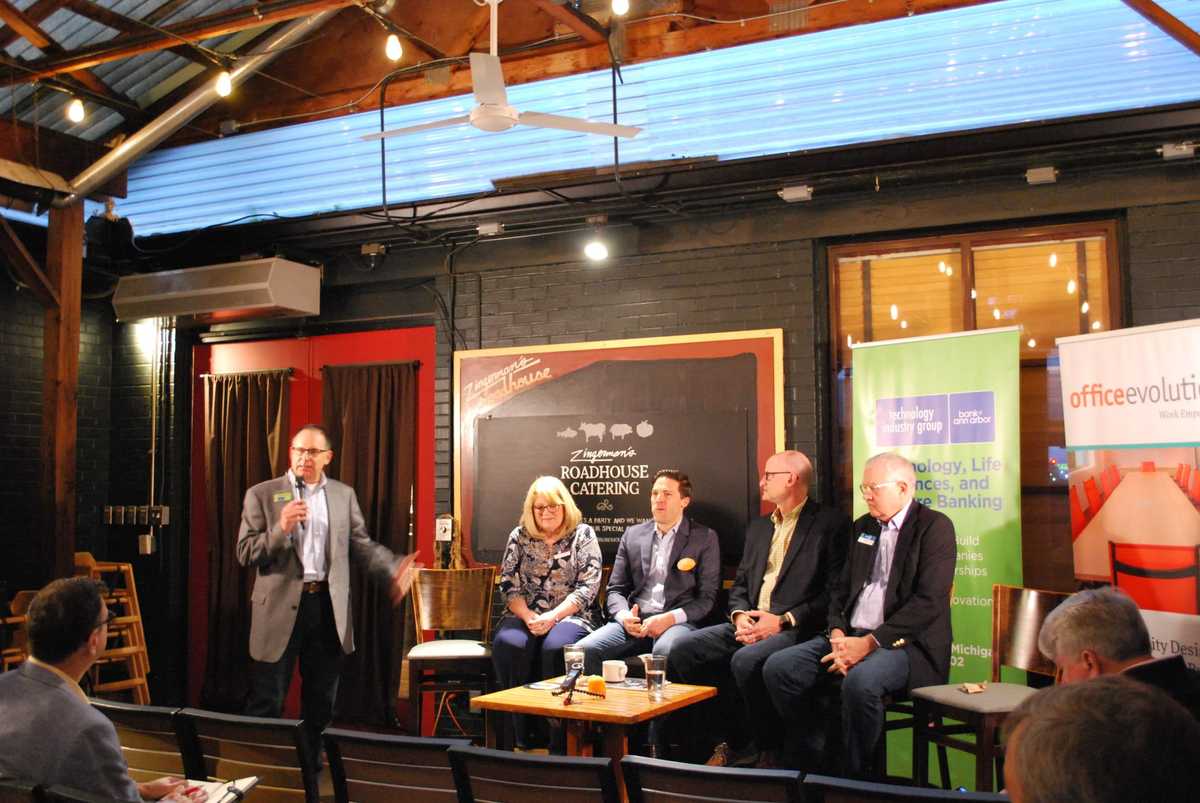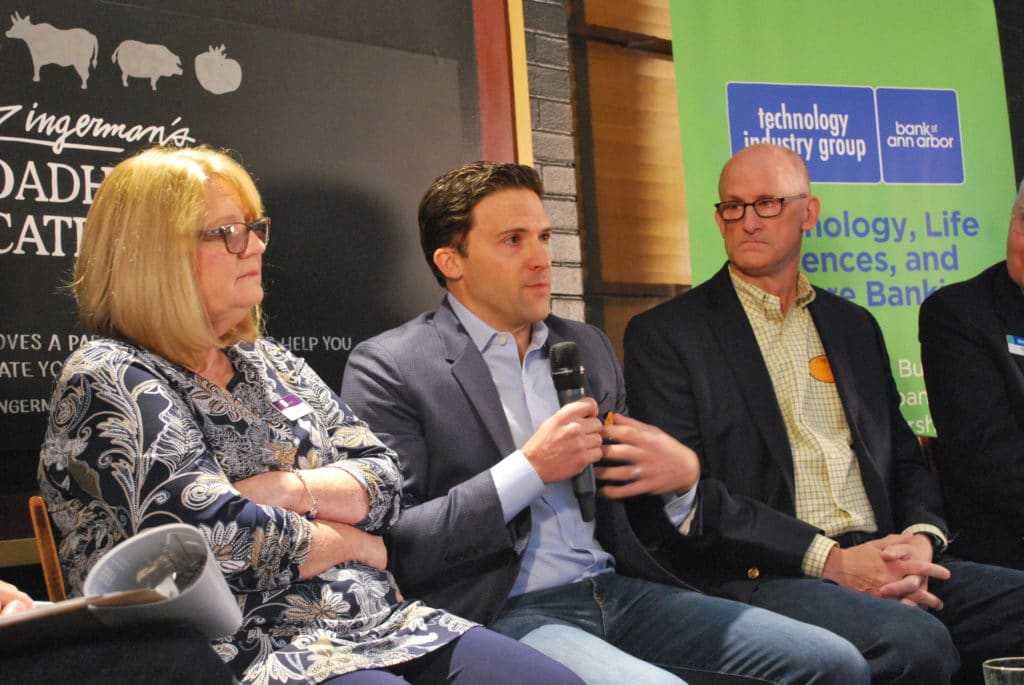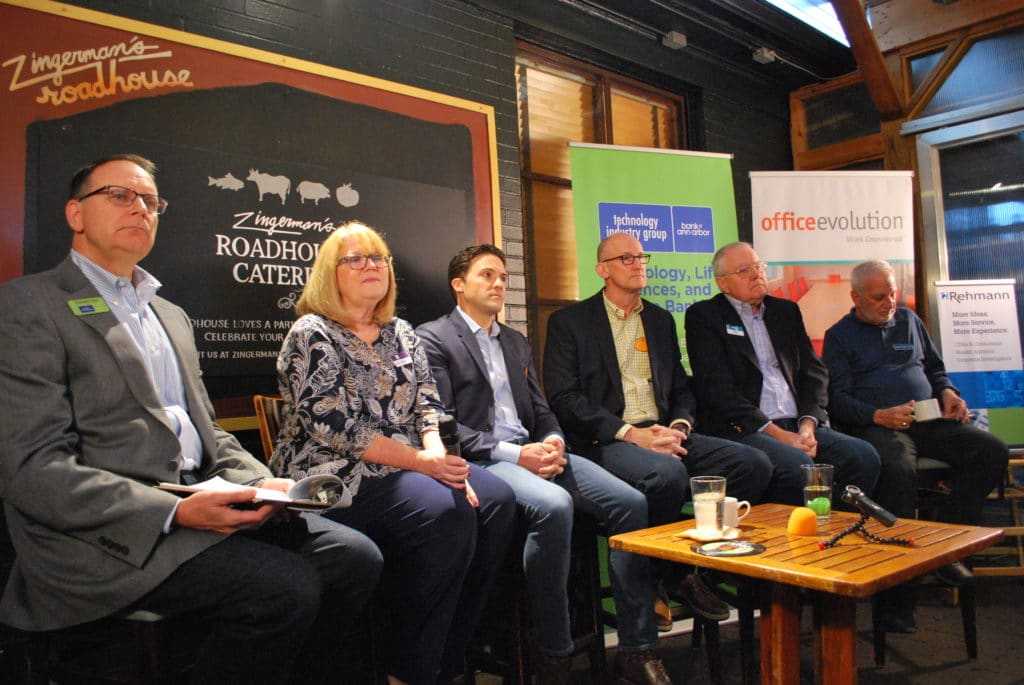The financing panel at Leaders Connect. From left to right, Michael Cole, Kris Bergman, Evan Ufer, Mike Klein, and Skip Simms.
It was a packed house at Zingerman's Roadhouse this week for a panel on the best options for financing your company. It's always worth it to get up for a 7 am breakfast here, because you are guaranteed to meet amazing new friends in the Ann Arbor business world, and because if you stay the full 2 hours your clothes will smell like the Zingerman's barbecue smoker all day.
The panel at this Leaders Connect breakfast hosted by executive coach, psychologist, and University of Michigan professor Dr. Rob Pasick included President of the Technology Industry Group at Bank of Ann Arbor Michael Cole, Managing Partner and Co-Owner of BBC Entrepreneurial Training & Consulting Kris Bergman, VC Evan Ufer of Plymouth Growth Partners, serial entrepreneur Mike Klein who is currently CEO of genomics startup Genomenon, and Skip Simms who is Senior VP of Ann Arbor SPARK and managing partner of the Michigan Angel Fund.
Leaders Connect host Dr. Rob Pasick addresses the audience as he creates space for attendees to announce latest ventures and requests. Second from right in the second row, Chris Sing of Rehmann, who can tell you just how complicated business tax writeoffs can be.
Among the first pieces of advice agreed upon by the group was this: "Don't raise capital until you have to." A lot of companies just don't need that much capital up front, and certain types of financing can cause problems and create expensive debt for new ventures. Kris Bergman explained a bit of her role helping companies secure grants for financing and how she works with the SBDC.
"VCs are having a harder time the last couple of years without as much state support," Skip Simms added. But, "you never know when the person you're talking to could be an angel investor," he said. "There are 4 new angel groups in Michigan just this year."
Among the first pieces of advice agreed upon by the group was this: "Don't raise capital until you have to."
"How many gazillion will I need to get started investing?" Dr. Rob asked the panel. Simms responded by saying you wouldn't want to put more than 5-10% of your assets at risk, 5% being more comfortable. "And that's invested over several years," he emphasized, "to create a basket of 10-20 companies. You want to be in it for the long term. These are not liquid assets." This money also cannot come from your retirement accounts, which won't allow you to invest in this asset class because it is high risk. "Half of all U.S. companies fail within 3-5 years," Simms said. "So plan on half of your investments failing." He did say that to invest with the Michigan Angel Fund, you would need $50,000 to start, but that varies widely by fund or syndicate.
Zingerman's pastries. Worth the 5:30 am wakeup time.
VC Evan Ufer of Plymouth Growth Partners stepped in to say that about 10% of all companies should raise capital. "That means 90% should not," he pointed out. Sometimes it's better to own 100% of a small company than 8% of a larger one, he said.
Plymouth Growth Partners is currently building its fourth fund at $71 million, and the group often helps companies that already have 2-5 million in revenue get to 10-15 million and exit to a strategic buyer. "We're in the market to raise a fifth fund next year," Ufer said. The industry Plymouth focuses on is tech in the Midwest, where they invest in Tier 2 markets like Columbus, Ohio, or Milwaukee that are below the radar of coastal markets that look for different things in an investment.
"We're looking for a stable Midwest company to back," Ufer said. "....We're not investing in startups, because they have different risks. We're looking for second-stage companies that have customers and have scaled and have a market to go upstream."
David Gregorka of Baird Capital and Tech Transfer asks a question. "He should be up here on this panel, along with a number of you in this room," panelists agreed.
"I don't know if you know this," Ufer joked, "but not all venture deals go perfectly. That will be the shocker of the day." The audience laughed. Point being: not all companies need VC backing, and not all need to focus on financing to succeed. "Find yourself an entrepreneur mentor," Ufer encouraged startup founders, "not a finance guy but someone who's had a real job."
"I don't know if you know this," Ufer joked, "but not all venture deals go perfectly. That will be the shocker of the day."
Handing the microphone to someone else, ahem, in finance, Ufer passed the conversation to Michael Cole of Bank of Ann Arbor, who wanted people to know how the Bank of Ann Arbor Technology Industry Group invests differently than VCs.
"I'm in year 17 of my 5-year plan," Cole laughed about how long he had now been running the group since founding it in 2002. "We pride ourselves on the relationship piece," he said of working with founders. "We work with startups to companies with 100 million in revenue. But we do focus on getting paid back more than the VC guys. We work with debt investment, not equity."
The panel took questions from several folks including Heather Martel, a local realtor and founder of a fintech group, who wanted to know more about convertibles versus safe notes--something the panel disagreed on heartily.
Kris Bergman and Mike Klein listen as VC Evan Ufer explains how Plymouth Growth Partners invests in second-stage Midwest tech companies.
"I hate it, it's a stupid vehicle," Skip Simms said of safe notes, and went on to explain exactly why the trend disturbed him. Audience member David Gregorka of Baird Capital and The Office of Tech Transfer at the University of Michigan pointed out some positives of the vehicle, which keeps some debt off the balance sheet before a company's debt-to-income ratio is examined in certain situations.
"It's complicated!" Chris Sing of event sponsor Rehmann, who handles business tax prep, called out after every stated opinion.
"As a special treat," Dr. Rob interjected, laughing, "they're giving away a quarter million today. Everybody look under your seat."
Finally Genomenon CEO Mike Klein took the mic, emphasizing that in his four companies he had built in 20 years, all of them had been financed differently, from seed funds to SBIR grants handled by folks like Kris Bergman, to founders chipping in to start a software company in his basement. This was back in the Nineties.
"There were not a lot of VCs in Michigan then," Klein said. "There were 2," he laughed, "and they both said no." Klein repeatedly pointed out that not only were different companies financed differently, but that these things can change over time as markets shift. One of his companies was in telecom in 2002 on top of the industry collapse, and this impacted how they pivoted.
The full panel listen to a question from the audience, which included startup founders, tax professionals, and a number of automotive professionals in transition to entrepreneurship.
The event finished with networking and breaking into groups to discuss different types of financing to learn more. We connected with Michael Cole's colleague Mary Hays of Bank of Ann Arbor, who said she wishes founders came to the bank sooner in their company building process and didn't put this off so long. "I don't know why people are so intimidated by talking with the bank as they first build their company," she said. "We'd really like to help guide them earlier in the process."
"I don't know why people are so intimidated by talking with the bank as they first build their company," Mary Hays of Bank of Ann Arbor said. "We'd really like to help guide them."
We met several entrepreneurs in the audience who were founding new ventures, including Catalina Kaiyoorawongs, who is creating a company called LoanSense to create a new option for company employees paying off student loan debt. The event seemed a good way to connect with business financing advice after the fact as needed, and you also are welcome to follow up with the panelists to ask your own questions. Even if it's complicated.






